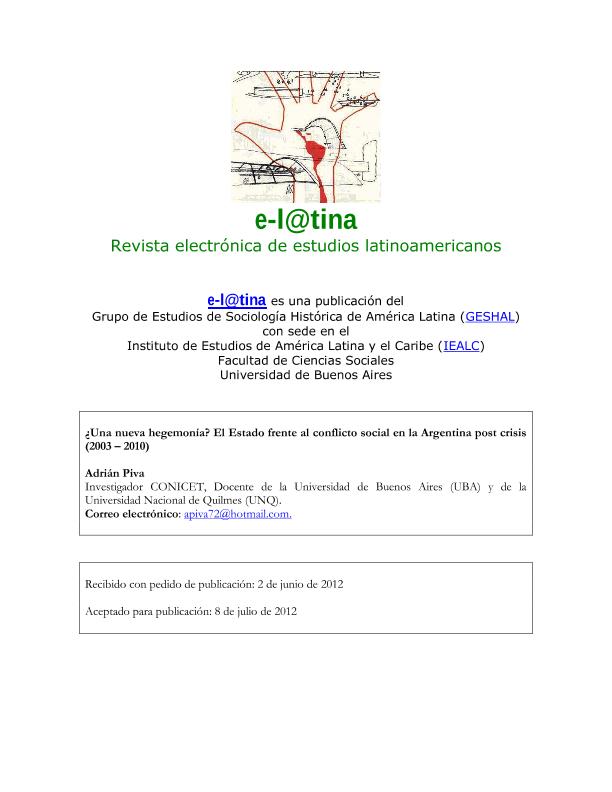Mostrar el registro sencillo del ítem
dc.contributor.author
Piva, Adrián

dc.date.available
2023-05-08T18:05:13Z
dc.date.issued
2012-07
dc.identifier.citation
Piva, Adrián; ¿Una nueva hegemonía? El estado frente al conflicto social en la Argentina post crisis (2003-2010); Universidad de Buenos Aires. Facultad de Ciencias Sociales; E-l@tina; 10; 40; 7-2012; 38-60
dc.identifier.issn
1666-9606
dc.identifier.uri
http://hdl.handle.net/11336/196700
dc.description.abstract
En este artículo nos preguntamos si la recomposición del poder político y del consenso en Argentina durante el período kirchnerista constituyó una nueva hegemonía. Trataremos de acercarnos a una respuesta a través del análisis de la relación entre Estado y conflicto social entre 2003 y 2010. Específicamente, analizaremos la capacidad del Estado para internalizar el conflicto social. Este aspecto apunta al corazón del problema en la medida que consideramos que la estructuración de mecanismos institucionales de canalización de los conflictos sociales, en tanto manifestaciones de las contradicciones sociales, constituye un aspecto nodal de toda hegemonía. Concluimos que una serie de indicadores señalan la existencia de una disputa en torno de dichos mecanismos. En estas condiciones, la recomposición del poder político asumió la forma limitada de un consenso en torno al Kirchnerismo, no de una redefinición de la lucha política en el marco de mecanismos institucionales consensuados por oficialismo y oposición. La oposición al Kirchnerismo tomó entonces el carácter de rechazo al modo de recomposición política y su acción política devino fácilmente anti institucional. El gobierno, entonces, tuvo éxito en polarizar el espacio político en términos de oposición Kirchnerismo – anti kirchnerismo. El costo de ese éxito fue sacrificar la constitución de una hegemonía que brindara estabilidad a la dominación.
dc.description.abstract
In this article we ask whether the restructuring of political power and consensus in Argentina during the Kirchnerist period constituted a new hegemony. We try to approach an answer by analyzing the relationship between state and social conflict between 2003 and 2010. Specifically, we analyze the state’s ability to internalize the social conflict. This aspect points to the heart of the problem to the extent we believe that the structuring of institutional mechanisms for channeling social conflict, defined as cojunctural manifestation of social contradictions, is a nodal dimension of any hegemony. We conclude that a number of indicators point to the existence of a dispute over these mechanisms. Under these conditions, the restructuring of political power took the form of a limited consensus around the Kirchnerism, not of a redefinition of the political struggle within the framework of institutional devices agreed by the ruling and opposition. As result, opposition to Kirchnerism took the character of a rejection to political recomposition mode and political action became anti institutional easily. The government then succeeded in polarizing the political space in terms of an opposition between Kirchnerism and anti Kirchnerism. The cost of that success was to sacrifice the constitution of a hegemony that would provide stability to the political domination.
dc.format
application/pdf
dc.language.iso
spa
dc.publisher
Universidad de Buenos Aires. Facultad de Ciencias Sociales

dc.rights
info:eu-repo/semantics/openAccess
dc.rights.uri
https://creativecommons.org/licenses/by-nc-sa/2.5/ar/
dc.subject
ESTADO
dc.subject
HEGEMONÍA
dc.subject
CONSENSO
dc.subject
CONFLICTO SOCIAL
dc.subject.classification
Sociología

dc.subject.classification
Sociología

dc.subject.classification
CIENCIAS SOCIALES

dc.title
¿Una nueva hegemonía? El estado frente al conflicto social en la Argentina post crisis (2003-2010)
dc.title
A new Hegemony? The State in front of the social conflict in the post-crisis Argentina (2003-2010)
dc.type
info:eu-repo/semantics/article
dc.type
info:ar-repo/semantics/artículo
dc.type
info:eu-repo/semantics/publishedVersion
dc.date.updated
2023-05-08T13:26:52Z
dc.journal.volume
10
dc.journal.number
40
dc.journal.pagination
38-60
dc.journal.pais
Argentina

dc.journal.ciudad
Ciudad Autónoma de Buenos Aires
dc.description.fil
Fil: Piva, Adrián. Consejo Nacional de Investigaciones Científicas y Técnicas; Argentina. Universidad de Buenos Aires; Argentina. Universidad Nacional de Quilmes; Argentina
dc.journal.title
E-l@tina

dc.relation.alternativeid
info:eu-repo/semantics/altIdentifier/url/https://publicaciones.sociales.uba.ar/index.php/elatina/article/view/2737
Archivos asociados
